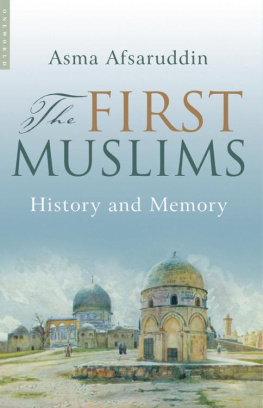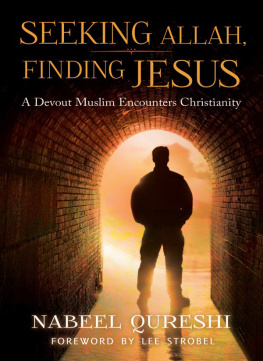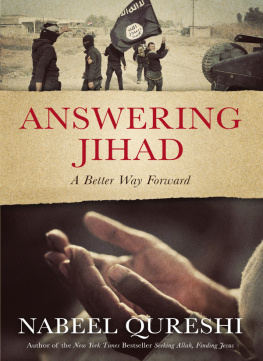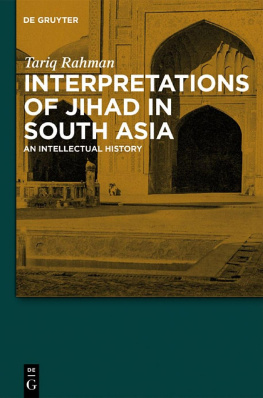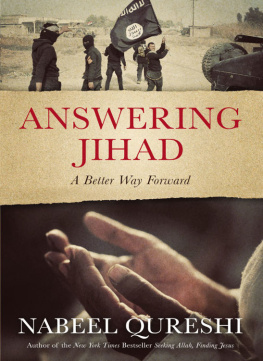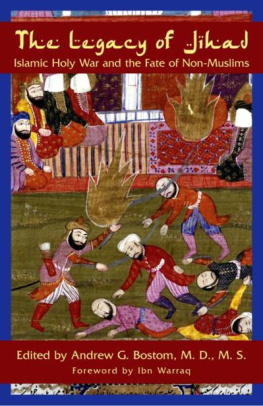JIHAD
WHAT EVERYONE NEEDS TO KNOW

Oxford University Press is a department of the University of Oxford. It furthers the Universitys objective of excellence in research, scholarship, and education by publishing worldwide. Oxford is a registered trade mark of Oxford University Press in the UK and certain other countries.
What Everyone Needs to Know is a registered trademark of Oxford University Press.
Published in the United States of America by Oxford University Press
198 Madison Avenue, New York, NY 10016, United States of America.
Oxford University Press 2022
All rights reserved. No part of this publication may be reproduced, stored in a retrieval system, or transmitted, in any form or by any means, without the prior permission in writing of Oxford University Press, or as expressly permitted by law, by license, or under terms agreed with the appropriate reproduction rights organization. Inquiries concerning reproduction outside the scope of the above should be sent to the Rights Department, Oxford University Press, at the address above.
You must not circulate this work in any other form and you must impose this same condition on any acquirer.
Library of Congress Control Number: 2021920937
ISBN 9780190647322 (pbk.)
ISBN 9780190647315 (hbk.)
ISBN 9780190647346 (epub.)
DOI: 10.1093/oso/9780190647315.001.0001
Contents
This book is intended for a broad readership. Its style is meant to be accessible, without being weighed down by the usual scholarly apparatus of dense and copious footnotes. I have also dispensed with the painstaking transliteration of Arabic names and terms and have adopted simplified spellings that will be more appealing to the nonspecialist English reader. It should be noted that when I introduce a new Arabic term, it is italicized at its first occurrence in each chapter and then subsequently written without italics. Many of these Arabic terms and names are repeated in the glossary at the end of the book. All dates are Common Era (Gregorian) and indicated by CE. For those who may lament the lack of footnotes in this book, I am happy to direct their attention to my longer (and densely footnoted!) book titled Striving in the Path of God: Jihad and Martyrdom in Islamic Thought (Oxford University Press, 2013), which provides full documentation for many of the points made in this work. Readers are encouraged to consult this earlier book as well as other publications listed in the bibliography.
An endeavor of this kind can only benefit from the input of colleagues and friends. I would like to take this opportunity to express my gratitude to John Voll of Georgetown University who took the time out of his very busy schedule to read the full draft of the book. His astute observations and comments were very insightful. Thanks are furthermore due to Mohammad Fadel of the University of Toronto and Tom Heneghan, former religion editor for Reuters and currently a freelance journalist, both of whom read parts of the manuscript and weighed in with their helpful feedback. I also acknowledge the helpful clarifications provided by Timothy Waters of Indiana University on points of modern international law. And, of course, I am grateful to Cynthia Read, indefatigable Executive Editor at Oxford University Press, who invited me to write this volume for the well-known What Everybody Needs To Know series and provided valuable guidance and feedback every step of the way. Her editorial assistant Brent Matheny was a model of efficiency and kept things moving at a brisk pace.
I also need to recognize various family members who kept me honest by constantly inquiring about the progress of this book and encouraging me to race towards the finish line. They include my mother, Maleka Khatun, sister Najma Hasib, and brother-in-law, Mansur Hasib. And, finally, I have to acknowledge the special debt I owe my husband, Steve Vinson, for the moral support he always provides. He also read the whole manuscript and was generous with incisive comments and suggestions for improvement from which I benefitted greatly. Needless to say, remaining shortcomings are mine alone.
Asma Afsaruddin
Bloomington, Indiana
September 13, 2021
The word jihad seems to be everywhere. It is frequently used, especially in the Western media, to refer to violent acts carried out by militants from Muslim backgrounds as part of a civilizational battle against the West. This is what even an educated non-Muslim in the West tends to reflexively associate with jihad; this perspective overwhelmingly colors public rhetoric about Islam and Muslims today. This is, however, a highly distorted understanding of a concept whose basic meaning is struggle, striving, utmost effort. For most Muslims, jihad represents the highest human struggle to promote and carry out what is morally good, just, and noble in all walks of life and to prevent what is morally wrong, unjust, and degrading to humans and all creatures. Such a struggle can and should be carried out by a variety of means, depending on the context: moral, ethical, spiritual, mental, intellectual, verbal, financial, physical, and military.
Jihad is, therefore, a polyvalent term; that is to say, it is a word that contains within it layers of meaning that become apparent in specific circumstances. This is why the concept of jihad needs to be considered from multiple perspectives: scriptural, theological, moral, ethical, legal, and sociopolitical. This book is intended to cover these multiple aspects of jihad. When I use the word jihad in general, I am broadly referring to the struggle of human beings to live their lives on earth in decent and morally praiseworthy ways and realize their full potential as human beings. Muslims understand this ongoing human struggle to be in accordance with the will of God. When I refer to the martial aspects of jihad, I use the term military jihad or combative jihad to indicate that it is being used in this limited sense. Observations about the military or combative jihad and rules governing it do not apply to other aspects of human striving on earth in specific sociocultural, spiritual, and intellectual realms.
The book emphasizes what I describe as a holistic approach to the complex concept of jihad. It adopts an approach that considers the terms various dimensions without unduly privileging the legal and military aspects of this term, as is usually the case. This work aims to provide a guide to the diverse understandings of jihad through time, from the early centuries of Islam until the contemporary period. By collecting this information in a single source, it is hoped the book will be a helpful resource for all those interested in an accessible treatment of this topic, grounded in scholarly sources: undergraduate and graduate students; specialists and nonspecialists, academics, public intellectuals, policymakers, journalists, and a general educated readership.
The book addresses key questions and (mis)perceptions about jihad that are common today in the West (and beyond). These popular (mis)perceptions are often based on three main assumptions:
Jihad is relentless, bloody warfare to be waged by all Muslims against all non-Muslims until Islam occupies the whole world or till the end of timewhichever occurs first.
Muslims can issue the call for such a jihad anytime and anywhere, with the sole excuse that stubborn unbelievers will not politically submit, willingly or unwillingly, at their hands. Militant groups today who declare jihad on their own against non-Muslims


